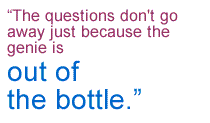
Sidebar: Biological Revolution or Misguided Priority?
When it comes to the Human Genome Project, Phil Bereano is the kid in the back of the class who keeps asking impertinent—but important—questions.
His biggest question: why undertake the project at all?
"We need to free ourselves from a false ideology that we need this particular knowledge," says Bereano, a professor of technical communication at the UW.

Technical communications professor Phil Bereano.
Bereano contends that Human Genome Project supporters overstated the project's potential medical benefits when lobbying Congress for funding. Bereano believes more people would reap more immediate benefit by expanding existing health care initiatives than by prospecting for cures in the human genome.
"It used to be that cancer was considered an environmental disease, but now it's being treated like a genetic disease," he says. "It's a tremendous social change that has been brought by the promises and all the hoopla surrounding the Human Genome Project."
Maynard Olson, director of the UW Human Genome Center, agrees that genome-based improvements to mainstream medicine will take time. Nevertheless, he says the Human Genome Project is worth the cost because it provides a platform for "revolutionizing basic biological sciences in a whole variety of ways."
What's more, "increasing knowledge of the natural world is a powerful social force," says Olson. For example, objective information from the Human Genome Project about what makes human beings similar and different may promote better racial understanding, he says. After all, "our subjective ideas of race have not served us well," he notes.
While completion of the draft human genome sequence may have neutered Bereano's cost argument, "the questions don't go away just because the genie is out of the bottle."

For one thing, Bereano has concerns about granting patents for the discovery of medically significant genes—something both Celera and the National Institutes of Health support as a way of stimulating development of new therapies. However, Bereano argues that taxpayers paid for most of the underlying research, that genes are an object of nature and that the level of intellectual innovation involved in their discovery does not constitute an invention.
Olson agrees that patents pose a problem—but only because the patent office has not set a high enough standard of proof that a particular gene or genes truly have medical significance.
Bereano also worries about the priorities of those seeking to develop tests and treatments based on the human genome. Will they look first at products that best serve the public—which funded most of the underlying research—or at those that will turn the biggest profit?
"We're told our cut will come through better medical care," he says. "My point is, it will be a long time coming, it won't be as much as promised and will be available only to a small number of people." —Brad Broberg
- Code Control, by Brad Broberg
- Private Company Makes Waves in Genomic Research
- Filling the Holes in Draft Genome
- UW Focus is on Technology Development
- Sidebar: Biological Revolution or Misguided Priority?
- Return to September 2001 Table of Contents